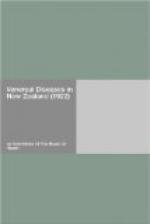Wellington Clinic: 40 per cent. of all cases continued treatment till non-infective, and very few of these were women.
Christchurch Clinic: Men with syphilis, 75 per cent.: men with gonorrhoea, 98 per cent.: women with syphilis, 50 per cent.: women with gonorrhoea, 14 per cent.
Dunedin Clinic: In this clinic only thirty-one males suffering from gonorrhoea were discharged cured: thirty-two absented themselves while still infective; three female cases remained under treatment till cured, and six ceased to attend while still infective. Forty male syphilitics remained till non-infective, and seventy-four ceased treatment before it was completed. For female syphilitics the figures are four and eighteen.
It will be noted that in each case the proportion of women who attend till non-infective is much smaller than of men, especially in cases of gonorrhoea. The reasons for this are probably that owing to anatomical considerations women infected with venereal disease suffer less pain and the disease is less obvious than in men. On cessation of the more urgent and obvious signs and symptoms they stop treatment. Again, it is probable that the publicity of attending the clinics is felt more by women than men. A third reason is the prolonged period of treatment (often extending over many months) necessary to eradicate gonorrhoea in women. These difficulties could to some extent be mitigated by the provision of arrangements for women to carry out treatment in their homes, which would avoid the publicity and loss of time entailed in attending clinics.
The Committee were impressed with the value of the work done by the lady patrol in Christchurch, and considers that lady patrols would help greatly in securing the attendance of women at the clinics. It is recommended that these patrols should be attached to the Hospital Boards and that they should be trained nurses. They would be available to give advice to patients as to treatment in their homes.
The Committee would also draw attention to the very valuable work done by the Social Hygiene Society in Christchurch, and recommended the establishment of similar voluntary societies in other centres.
The Committee recommend that all bacteriological and other examinations required for the diagnosis and treatment of cases of venereal diseases should be carried out in laboratories of the Department of Health and public hospitals free of cost, on the recommendation of medical practitioners.
The Committee made inquiries from competent witnesses as to the present position of the complement fixation test in gonorrhoea. It appears that this test has not reached yet such a degree of reliability as to render it of great diagnostic value, but that it is reasonable to hope that it may be perfected to such an extent to give it a value in the diagnosis of gonorrhoea comparable to that of the Wassermann test in syphilis.




